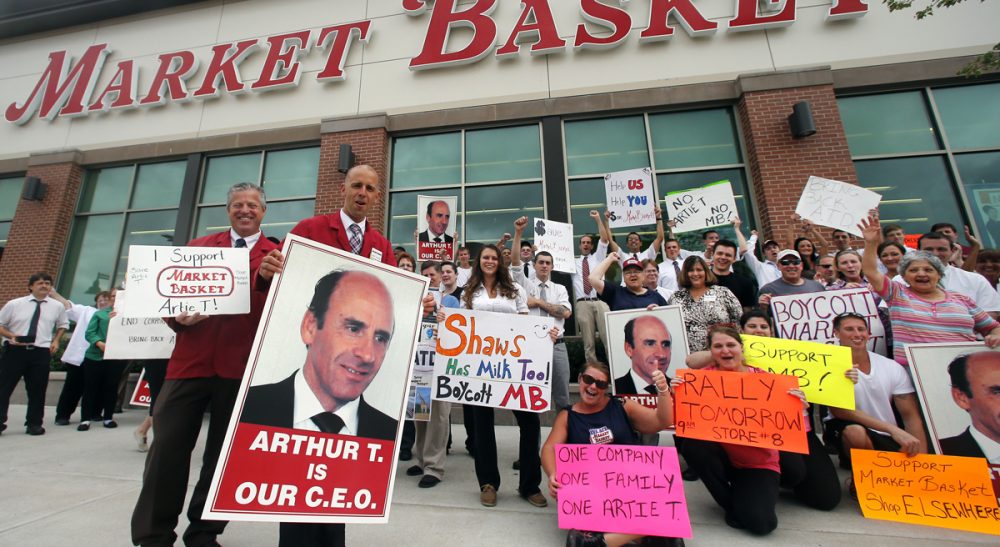Advertisement
How Market Basket Can Right Its Course

The Market Basket saga continues. Unless there is a change of course, however, all parties — owners, employees and customers — will lose. There is an alternative path that could get employees and customers back quickly and restructure the company in ways that preserve its value and reputation for quality service.
Following more than a week of dramatic protests by employees and customers against a new management team, a much-anticipated board of directors meeting on Friday, July 25, yielded five results. Four of them were announced after the meeting adjourned; the fifth, with the help of a newly hired public relations firm, was tacked on hours later.
...Market Basket owners and employees remain in a downward spiral. If not reversed, and soon, the result will be a substantial reduction in the value -- if not the total liquidation -- of the owners’ assets and the loss of many, if not all, employees’ jobs.
First, the board of directors admitted publicly and for the first time that the company is, indeed, for sale. As protesting employees already suspected, the investment banking arm of J.P. Morgan Chase has, for some time, been orchestrating a sale process that that involves more than one bidder and remains open.
Second, Arthur T. Demoulas, Market Basket’s ousted CEO, is officially among the bidders.
Third, the board affirmed their support of beleaguered co-CEOs, Felicia Thornton and James Gooch, who were hired in mid-June.
Fourth, in promising a return to business, the board didn’t miss an opportunity to chastise its protesting employees:
“The negative behavior of certain current and former associates is at variance with the Company’s culture of putting the needs of the Market Basket customers first. It is now clear that it is in the interests of all members of the Market Basket community for normal business operations to resume immediately,”
Fifth, with the help of P. R. firm O’Neill & Associates, the board reconsidered the tone of its fourth point, and issued a new statement that substitutes empathy for criticism:
“The past month has been trying. We appreciate the strain this change of leadership has placed on our associates. We welcome back associates who are committed to Market Basket’s customers. There will be no penalty or discipline for any associate who joins in what will be a significant effort to return to the unparalleled level of performance and customer service that have been hallmarks of the Market Basket brand. There will be no change to Market Basket’s unmatched compensation and benefits.”
If comments on the ‘Save Market Basket’ Facebook page, organized by protesting employees, are any indication, this last point convinced no one. After invoking the legendary protest song of Johnny Paycheck — “Take your amnesty and…” — protesters pointed out the divide between the softer, gentler public relations approach and prior threats to replace protesting employees. It seems unlikely that the board’s after-thought attempt at conciliation will return matters to the status quo.
Instead, in the wake of these board actions and a week of protests that grew stronger with each day, Market Basket owners and employees remain in a downward spiral. If not reversed, and soon, the result will be a substantial reduction in the value — if not the total liquidation — of the owners’ assets and the loss of many, if not all, employees’ jobs.
So, how to right its course? How can Market Basket bring employees and customers back while credibly and clearly addressing the core interests of the owners and employees and sustaining the business for the long run?
First, bring back Arthur T. He led the company in ways that built loyalty with both employees and customers, and employees — as well as customers who have joined the protests — want him back.
Second, negotiate with Arthur T. over his offer to buy the company before considering other offers. He could, in turn, urge employees and customers to come back. Especially if an employee ownership component is part of the talks.
...it is important not to deny what is new here: a brave assertion by thousands of people with much at risk to protect their livelihoods and to demand leadership they can trust.
Third, reinstate the executives who were fired, perhaps on a contract or consulting basis to focus on helping bring customers back as the sale process proceeds. Once a deal is made, they and the new management team can decide if they stay on with the restructured company.
The combined effects of these actions would bring back employees and customers, restore shareholder value and provide a viable path for sustaining the business in the manner that built its loyal customer base.
The Market Basket fiasco has become a national story. While a difficult one, it is also a welcome one that breaks down many of the stale caricatures describing labor and management in the American workplace. Market Basket employees have asserted an implicit right of “natural ownership” of what they believe to be their company. Whether that psychological ownership can be partially realized through legal ownership is up to insiders to determine. Whatever the result, it is important not to deny what is new here: a brave assertion by thousands of people with much at risk to protect their livelihoods and to demand leadership they can trust. At the end of the day, that message should be responded to affirmatively by the present day owners of Market Basket.
Advertisement
Related:
